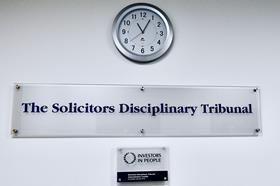Decisions filed recently with the Law Society (which may be subject to appeal)
Elizabeth Oruene Ikiriko
Application 12696-2024
Admitted 2002
Hearings 1-3 July 2025
Reasons 11 July 2025
The Solicitors Disciplinary Tribunal ordered that the respondent should be suspended from practice for six months from 3 July 2025, such suspension to be suspended for one year on the condition that within the period of one year the respondent undertook CPD-accredited course(s) on the Code of Conduct, the SRA Principles and professional standards of not less than 10 hours.

While in practice as a solicitor at Melrose Solicitors, on or around 1 June 2021, the respondent had signed a power of attorney as a witness, confirming that the PoA had been signed by the donors, person A and client B, when person A had not signed the PoA in her presence, thereby breaching principles 2 and 5 of the SRA Principles 2019 and paragraph 1.4 of the SRA Code of Conduct for Solicitors, RELs and RFLs.
Between 29 May 2021 and 1 June 2021, the respondent had failed to act in the best interests of person A, in that she had failed to ensure that person A had been properly advised of the consequences of signing the PoA, thereby breaching principles 2 and 7 and paragraph 3.4 of the Code for Solicitors.
The respondent’s motivation for the misconduct had arisen from ‘misplaced compassion’ and deeply held traditional moral values about marriage and family. It was clear that the respondent’s subjective view had impacted negatively on her professional objectivity.
Essentially, the suspended suspension reflected a conclusion that the respondent’s conduct, while objectively wrong and professionally inadequate, represented an error in judgement under difficult circumstances rather than a failing deserving of the most severe sanctions.
Solicitors, as legal professionals, had to ensure that they retained professional objectivity and sought help, or at least a second opinion, where there was a danger that such objectivity was challenged or capable of being compromised.
The respondent was ordered to pay costs of £15,000.
Alison Haley Griffiths
Application 12759-2025
Admitted 2003
Hearing 1 August 2025
Reasons 18 August 2025
The SDT ordered that the respondent should be struck off the roll.
While in practice as a solicitor at Regulatory Law Limited between 1 December 2018 and 20 February 2021, while acting under a lasting power of attorney for client A, the respondent had abused her position by misappropriating £49,482.52 from client A’s bank account, contrary to section 4 of the Fraud Act 2006, thereby breaching principles 2 and 6 of the SRA Principles 2011, and failing to achieve outcome 11.1 of the SRA Code of Conduct 2011, and principles 1, 2, 4 and 5 of the SRA Principles 2019, and paragraph 1.2 of the SRA Code of Conduct for Solicitors, RELs and RFLs 2019. The respondent’s conduct was dishonest in respect of the period up to 25 November 2019.
Between 1 March 2021 and 1 October 2021, while acting under an LPA for person B, the respondent had abused her position by misappropriating £35,790 from person B’s bank account, contrary to section 4 of the Fraud Act 2006, thereby breaching principles 1, 2, 4 and 5 of the SRA Principles 2019 and paragraph 1.2 of the SRA Code of Conduct for Solicitors, RELs and RFLs 2019.
The applicant relied upon the respondent’s convictions for the offence of fraud by abuse of position contrary to section 4 of the Fraud Act 2006 on 4 August 2023 and 6 December 2023, as evidence that the respondent was guilty of those offences and relied upon the findings of fact upon which those convictions were based as proof of those facts. On 2 February 2024, the respondent had been sentenced to 24 months’ imprisonment on each account to run concurrently.
The parties invited the SDT to deal with the allegations against the respondent in accordance with the statement of agreed facts and outcome annexed to the judgment.
The SDT had reviewed all the material before it and was satisfied on the balance of probabilities that the respondent’s admissions had been properly made.
Within the sphere of regulatory and disciplinary conduct, there could be no mitigation to minimise the harm. The respondent’s misconduct could only be viewed as extremely serious and no sanction less than a strike-off would be sufficient to protect the public and the reputation of the profession.
It was ordered that there be no order as to costs.






























